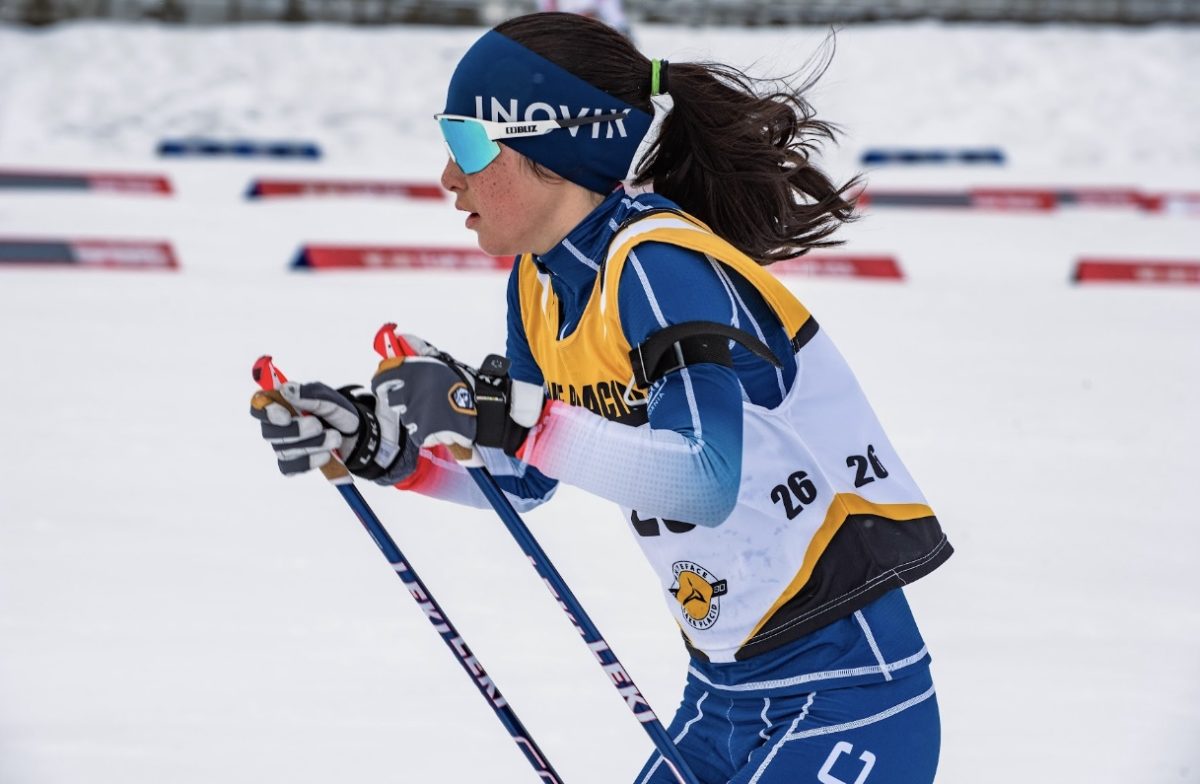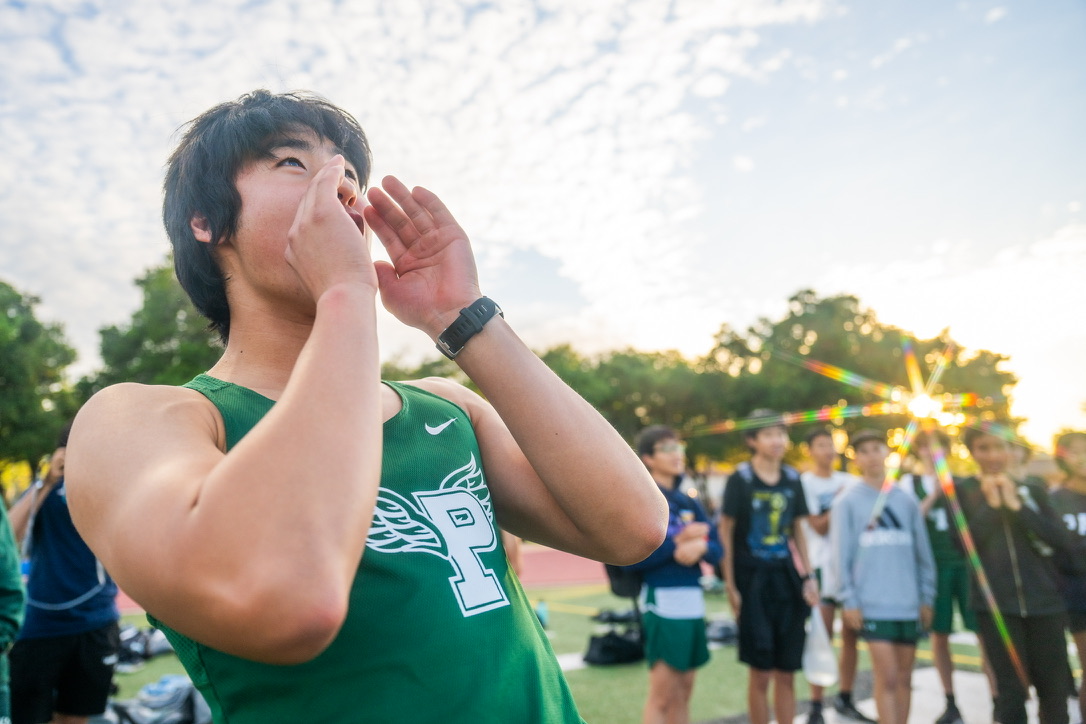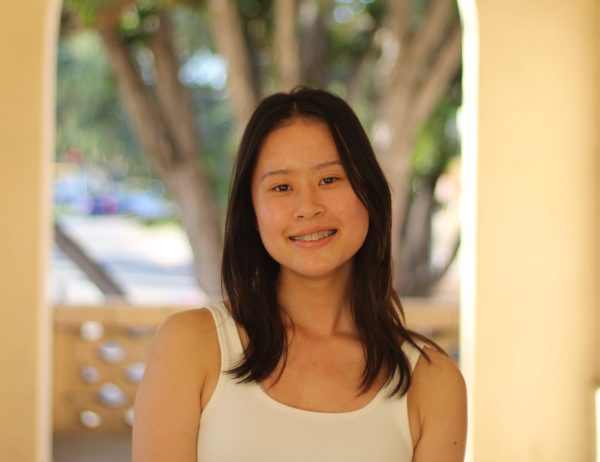Snowflakes gently drift across the sky, and the snow-capped mountain range lies still, scattered with trees decorating the horizon –– a gust of wind suddenly cuts through the air as junior Megan Lemoine flashes by, an eight-pound rifle strapped to her back. Gripping her poles, Lemoine sweeps through the snow on her skis before flipping onto her stomach, rifle in hand.
With her eyes fixed on the target and her finger resting on the trigger of her rifle, Lemoine lies on a biathlon range in Lake Tahoe, California’s only one. Biathlon, an Olympic sport that combines cross country skiing and rifle shooting, caught Lemoine’s interest when she and her family moved to Lake Tahoe during her 7th grade year in the middle of the COVID-19 pandemic.
“We preferred to be in Tahoe and in the mountains around the snow,” Lemoine said. “When the pandemic happened and everything switched to online, we took the opportunity to spend more time in the mountains and get more time skiing.”
Prior to moving to Lake Tahoe, Lemoine skied downhill with her family almost every weekend, and she said her dad grew up cross-country skiing in the woods behind his childhood home.
“I discovered biathlon because of my dad,” Lemoine said. “He was super into watching the Biathlon World Cup, so I started watching it with him. We found out there was a biathlon range in Tahoe not too far away from our house, so I signed up for a clinic.”
Although that clinic was ultimately canceled, Lemoine said she eventually joined Auburn Ski Club, a biathlon team.
“The first time I held my rifle, I was a little bit afraid of it,” Lemoine said. “But my coach had a one-on-one session with me to get me situated with the rifle. That helped me learn really quickly, and then within a few weeks, I got into the rhythm.”
As she built familiarity with her rifle, Lemoine said she practiced different race formats, including two shooting positions –– prone, which is done lying down, and standing –– and four main biathlon events: the pursuit, sprint, individual and mass start, which are differentiated by race length and shooting stages. Lemoine said learning these formats became instrumental to mastering the sport because of the intricate rules of biathlon.
“You get penalties for missed shots,” Lemoine said. “For every shot you miss, you get a minute added to your time, which is a huge penalty, and it can be really detrimental. For people in the World Cup, one shot can ruin their whole individual race because it adds a minute to their time.”
Lemoine also said combatting the stress involved in biathlon requires diligence and control to ensure both speed and accuracy.
“During cross-country skiing, your heartbeat is super elevated,” Lemoine said. “When you come in to shoot, you have to deal with a super high heart rate, and you have to really focus on recovering from the effort and lowering your heart rate quickly so that you can focus on the targets.”
While shooting, Lemoine said she focuses on switching her mindset from racing, which requires being perceptive of her opponents, to precision, which necessitates focus and clarity.
“If you start shooting and you start missing targets, then you need to be in a mindset where you’re not getting distracted from those missed targets,” Lemoine said. “And if I’m more aware of how the people beside me are shooting, it will really affect me and usually make my shooting a lot worse. It’s all about focusing on my own race and trying to tune out the other people.”
And Lemoine said this mindset has improved her work ethic at school.
“Biathlon really helps my mental discipline,” Lemoine said. “It’s helped me a lot with trying to stop procrastinating because the skills I’ve learned from biathlon have really helped me focus on my school work so that I can get it done quickly.”
Since starting in-person school again at Paly, Lemoine said it has become more difficult to train in Lake Tahoe, but she said running on the cross country and track team help her maintain her endurance and stamina.
“Practice for me is a bit of a juggling act because I can’t be in Tahoe every day to practice,” Lemoine said. “The cross country season and the track season are really helpful because it helps me stay in shape. Especially as I get closer to bigger races and during the winter, I try to go out and roller ski around Palo Alto.”
Despite her distance from the range, Lemoine still drives up to Lake Tahoe every weekend, training with her cross country ski team on Saturdays and her biathlon team on Sundays.
“It has been really challenging, but when I’m training, it helps me wake up and get more focused, so that it’s easier to do the things that I want to do later on,” Lemoine said.
Although Lemoine has had experience in running and downhill skiing from a young age, she said she lacks experience in cross country skiing compared to others on her ski team.
“The biggest difficulty for me is that I started skiing really late,” Lemoine said. “I started shooting around the same time as a lot of kids doing biathlon do, but a lot of the people doing biathlon start cross country skiing when they’re 5, and they have access to snow every day during the winter. But I’ve made a ton of progress and I’m getting more competitive with people skiing in my age group.”
But through targeted practice, Lemoine said she is building strength in cross country skiing.
“Downhill skiing helped me because I was kind of used to being on snow, but cross country skiing is still very different,” Lemoine said. “I had the physical strength and endurance from running, but cross country skiing is a very different technique, and it uses different muscles, so having that discipline while I was starting to train and get more seriously into biathlon was really important for me to improve.”
And by progressing quickly, Lemoine said she has already been able to compete in several national biathlon races.
“My first time going to biathlon nationals was my most memorable experience,” Lemoine said. “It might have been the biggest biathlon nationals hosted before, and I got to race against a ton of different people. I also got to meet a ton of the U.S. national team members and race on the Olympic facilities, which was super special.”
Of the American biathletes, Lemoine said she is particularly inspired by Joanne Reid, who competed at the 2018 Winter Olympics and 2022 Winter Olympics.
“She’s a former U.S. national biathlon team member and also a former Olympian,” Lemoine said. “But what is inspiring to me is that she became super successful in biathlon even though she also grew up in Palo Alto and did not have access to snow all the time.”
Lemoine said learning about and connecting with individuals like Reid helped her form deeper connections within the sport.
“The most rewarding aspect of biathlon is honestly the community,” Lemoine said. “It is a super supportive and super nice community, and I’ve gotten to meet so many people across the country that are all proud of biathlon and promoting it, so it’s really valuable to make those connections between people.”
After making strides only four years into biathlon, Lemoine said she is excited for the future of biathlon for herself and new athletes interested in the budding sport.
“This year, I thought maybe I would try to ski in college, whether that’s at a school or just club skiing,” Lemoine said. “I’m hoping that I can keep doing biathlon and continue meeting new people and getting more involved in the sport wherever I end up in the future.”






